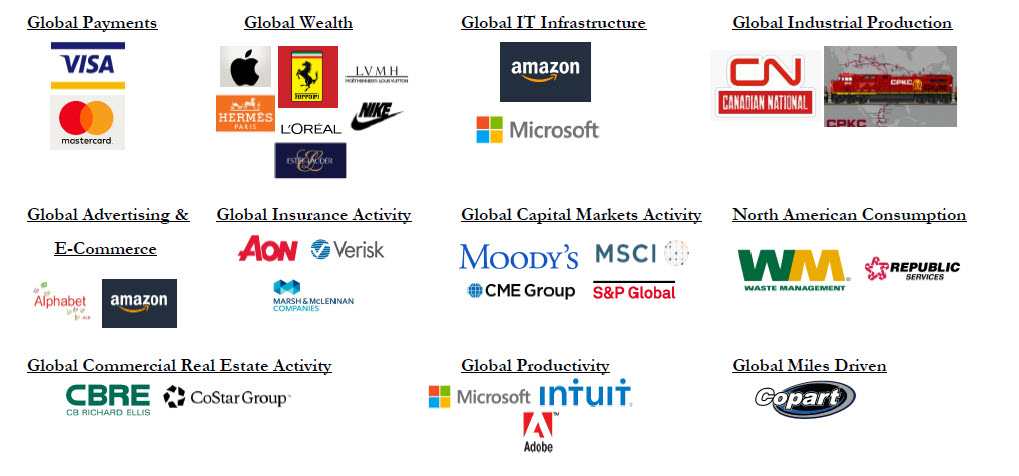The S&P 500 Index returned 11.69% and the S&P Global Broad Market Index returned 11.18% in the quarter ended December 31, 2023, capping off a strong year of greater than 20% gains for both indices.1
As we look to 2024, a few clients have expressed concern about the stock market given economic and inflation uncertainty, continued geopolitical risk, and what appears so far to be a particularly contentious presidential election year. These concerns are legitimate, and one or more of these issues could cause the stock market to decline. However, in assessing whether we should change our investment allocation or approach in response to these problems, we think it’s important to keep three things in mind:
First, over the long term, stocks have historically generated far more wealth than Treasury bills and bonds. From 1927 to 2023, a $100 investment in 3-month Treasury bills grew to $2,249.04, and a $100 investment in 10-Year Treasury bonds grew to $7,278.61.2 Pretty good, right? Not when compared to the S&P 500, which, including dividends, turned $100 into a staggering $787,018.53, almost 350 times the 3-month Treasury bill investment and over 100 times the 10-Year Treasury bond investment. Moreover, this large return premium over government bills and bonds wasn’t just a U.S. phenomenon. In every single one of the 20+ countries with continuous market histories from 1900 to 2022 that Elroy Dimson, Paul Marsh, and Mike Staunton examined in their Credit Suisse Global Investment Returns Yearbook 2023, stocks significantly outperformed government bills and bonds.3 Importantly, this universal long-term outperformance occurred despite many of the countries having suffered multiple pandemics, depressions, and hyperinflations during the period studied. It even occurred in the countries that lost the two World Wars fought during this period.
We believe one of the key drivers of this outperformance is that, as opposed to government bonds and bills, which are relatively static instruments with few degrees of freedom once they are issued, stocks are equity ownership stakes in businesses comprised of adaptable and innovative teams of people who grow the world’s wealth by solving problems and serving their customers. As global interconnectivity has increased over the last two hundred years, it has enabled both the number and the reach of these business’s teams to grow exponentially. This explosion of innovation has led to a world of rapid wealth growth, some of which the businesses have retained for their shareholders. Given that 1) connectivity continues to increase with the worldwide smartphone penetration rate at 68% and rising;4 2) over a billion people are expected to join the global middle class over the next decade;5 and 3) technological innovation continues in key areas such as energy, artificial intelligence, and genetics, we believe the wealth creation that drove this exceptional business value growth is likely to continue, and, as a result, that stocks are likely to continue to generate long-term return premiums well in excess of government bills and bonds.
Second, stocks will experience uncomfortable periods of downside volatility from time to time, but, unfortunately, we have yet to find any evidence that the timing or magnitude of these periods can be consistently predicted in advance. This past year served as a particularly salient case in point. Eighty-five percent of economists predicted a recession in 2023,6 and the Wall Street strategist consensus was that investors should sell U.S. stocks, buy U.S. Treasuries, and buy Chinese stocks.7 How would an investor have fared who acted on this advice? He or she would have worried all year about a recession that never came, missed an over 26% total return in U.S. stocks,8 experienced a bumpy but ultimately sideways ride in 10-year Treasuries,9 and lost over 11% in Chinese stocks.10 To be clear, we don’t think we would have been any more accurate. We know we can’t predict the market, and, as a result, we don’t waste our time trying to do so.
Third, since we can’t predict the future, we’ve tried instead to construct a portfolio that can both participate in the long-term upside of global economic growth and wealth creation and survive the inevitable but unpredictable down periods in the economy. We believe we’ve accomplished this goal by assembling a diverse collection of global champions that 1) own dominant networks; 2) possess other checks on competing supply such as not-in-my-backyard (NIMBY) zoning restrictions, institutional risk aversion, and switching costs; 3) operate in categories that we believe will grow at least as fast as GDP; 4) have conservative balance sheets; 5) are run by ownership-minded management teams; and 6) generally possess significant untapped pricing power. In doing so, we believe we’ve created a portfolio that is a diversified, recession-resistant toll collector on global GDP, which we have visualized by creating the infographic below.11
Conclusion
The world has many problems, and it always seems like every one of them could easily get worse. This year is no different. Conflicts are raging in Ukraine and the Middle East. Tensions between the U.S. and China are increasing. Political battles are getting increasingly hostile ahead of the 2024 presidential election. The U.S. government continues to run deficits, adding to government debt, despite the warning signs of higher inflation and interest rates. All these situations seem like powder kegs waiting for a spark. Some of them (or others that we don’t even anticipate yet) could explode in the coming year, but, unfortunately, we can’t predict when or where these explosions will occur. However, against this dangerous backdrop, we think it’s important to remember that innovation and knowledge sharing, driven by increased connectivity, have allowed humanity to increase its wealth at almost unbelievable rates over the last 200 years despite arguably even worse historical challenges. With this innovation and knowledge sharing showing no signs of abating (and perhaps even speeding up), we believe wealth creation and global economic growth are likely to continue for many years to come.
Our portfolio of diverse, dominant, and conservatively capitalized businesses is constructed to deal with this reality that wealth has increased tremendously over time but not without occasional and unpredictable periods of turmoil that have interrupted or retraced some of this progress. In fact, we think of the portfolio as a recession-resistant toll collector on global GDP that is likely to not only survive the large powder kegs thrown its way but also greatly benefit from the long-term global growth that we think is likely to materialize in the coming decades.
As always, thank you so much for your trust, know that we continue to be invested right alongside you, and please always reach out to us if you have any questions or concerns. We’re here to help!
Sincerely,
The YCG Team
Disclaimer: The specific securities identified and discussed should not be considered a recommendation to purchase or sell any particular security nor were they selected based on profitability. Rather, this commentary is presented solely for the purpose of illustrating YCG’s investment approach. These commentaries contain our views and opinions at the time such commentaries were written and are subject to change thereafter. The securities discussed do not necessarily reflect current recommendations nor do they represent an account’s entire portfolio and, in the aggregate, may represent only a small percentage of an account’s portfolio holdings. A complete list of all securities recommended for the immediately preceding year is available upon request. These commentaries may include “forward looking statements” which may or may not be accurate in the long-term. It should not be assumed that any of the securities transactions or holdings discussed were or will prove to be profitable. S&P stands for Standard & Poor’s. All S&P data is provided “as is.” In no event, shall S&P, its affiliates or any S&P data provider have any liability of any kind in connection with the S&P data. MSCI stands for Morgan Stanley Capital International. All MSCI data is provided “as is.” In no event, shall MSCI, its affiliates or any MSCI data provider have any liability of any kind in connection with the MSCI data. Past performance is no guarantee of future results.
1 For information on the performance of our separate account composite strategies, please visit www.ycginvestments.com/performance. For information about your specific account performance, please contact us at (512) 505-2347 or email [email protected]. All returns are in USD unless otherwise stated.
2 See https://pages.stern.nyu.edu/~adamodar/New_Home_Page/datafile/histretSP.html.
3 See https://www.credit-suisse.com/about-us-news/en/articles/news-and-expertise/global-investment-returns-yearbook-2023-202302.html.
4 See https://www.statista.com/statistics/203734/global-smartphone-penetration-per-capita-since-2005/.
5 See https://knowledge4policy.ec.europa.eu/growing-consumerism_en.
6 See https://richmond.com/opinion/column/tyler-cowen-how-were-so-many-economists-so-wrong-about-the-recession/article_bc784ce4-a9aa-11ee-9f00-174864adf057.html.
7 See https://finance.yahoo.com/news/everything-wall-street-got-wrong-000011187.html?fr=sycsrp_catchall.
8 See https://www.msci.com/documents/10199/ce3c024c-cf00-4950-811b-b2f5f87c3218.
9 See https://www.bloomberg.com/news/articles/2023-12-29/us-10-year-yield-is-ending-2023-almost-exactly-where-it-started.
10 See https://www.msci.com/documents/10199/e67c4c7b-b016-4e59-a460-b42574cde2e6.
11 While they are great businesses with powerful competitive advantages that we believe will persist over time, our small holdings in Pepsi, Unilever, Procter & Gamble, Colgate, and Progressive don’t fit quite as neatly into our toll collector framework, so we’ve excluded them from the graphic.





